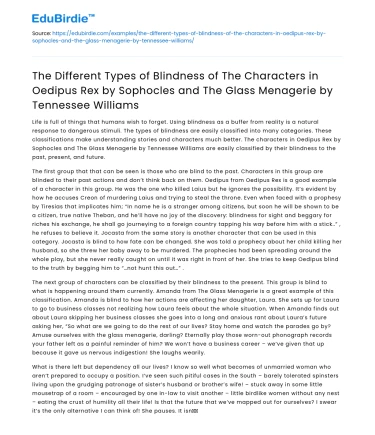Life is full of things that humans wish to forget. Using blindness as a buffer from reality is a natural response to dangerous stimuli. The types of blindness are easily classified into many categories. These classifications make understanding stories and characters much better. The characters in Oedipus Rex by Sophocles and The Glass Menagerie by Tennessee Williams are easily classified by their blindness to the past, present, and future.
The first group that that can be seen is those who are blind to the past. Characters in this group are blinded to their past actions and don’t think back on them. Oedipus from Oedipus Rex is a good example of a character in this group. He was the one who killed Laius but he ignores the possibility. It’s evident by how he accuses Creon of murdering Laius and trying to steal the throne. Even when faced with a prophesy by Tiresias that implicates him; “In name he is a stranger among citizens, but soon he will be shown to be a citizen, true native Theban, and he’ll have no joy of the discovery: blindness for sight and beggary for riches his exchange, he shall go journeying to a foreign country tapping his way before him with a stick..” , he refuses to believe it. Jocasta from the same story is another character that can be used in this category. Jocasta is blind to how fate can be changed. She was told a prophecy about her child killing her husband, so she threw her baby away to be murdered. The prophecies had been spreading around the whole play, but she never really caught on until it was right in front of her. She tries to keep Oedipus blind to the truth by begging him to “…not hunt this out…” .
Save your time!
We can take care of your essay
- Proper editing and formatting
- Free revision, title page, and bibliography
- Flexible prices and money-back guarantee
The next group of characters can be classified by their blindness to the present. This group is blind to what is happening around them currently. Amanda from The Glass Menagerie is a great example of this classification. Amanda is blind to how her actions are affecting her daughter, Laura. She sets up for Laura to go to business classes not realizing how Laura feels about the whole situation. When Amanda finds out about Laura skipping her business classes she goes into a long and anxious rant about Laura’s future asking her, “So what are we going to do the rest of our lives? Stay home and watch the parades go by? Amuse ourselves with the glass menagerie, darling? Eternally play those worn-out phonograph records your father left as a painful reminder of him? We won’t have a business career – we’ve given that up because it gave us nervous indigestion! She laughs wearily.
What is there left but dependency all our lives? I know so well what becomes of unmarried woman who aren’t prepared to occupy a position. I’ve seen such pitiful cases in the South – barely tolerated spinsters living upon the grudging patronage of sister’s husband or brother’s wife! – stuck away in some little mousetrap of a room – encouraged by one in-law to visit another – little birdlike women without any nest – eating the crust of humility all their life! Is that the future that we’ve mapped out for ourselves? I swear it’s the only alternative I can think of! She pauses. It isn’t a very pleasant alternative, is it? She pauses again. Of course – some girls do marry.” (Scene 2). This rant shows her disconnection with her daughter and how obviously blind she is to her daughter’s wants and needs. Tom from The Glass Menagerie also fits into this classification because of how blind to the consequences of his current choices he is. He is always just doing whatever he wants, whenever he pleases without thinking about the repercussions. He even got fired from his job for “writing a poem on the lid of a shoebox.” (Scene 7). This shows how blind he is to his current actions and how he doesn’t think about what he does before he does it.
The third group of classification is blindness to the future. This group is blind to what the future holds. Amanda is the perfect fit for this classification. She is blind to what the future holds for her and her family. She is terrified of this fear and lets it control her decisions. When Laura stops going to business school she asks herself, “What are we going to do, what is going to become of us, what is the future?” (Scene 2). She tries so hard to start a future for her children but is blind to where they will end up. Even Laura fits into this classification. Laura is so blind that she doesn’t even think about the future. Her mother set’s her up so that she may live a life worth living, but drops it because she was frightened. She doesn’t see any error in her actions above the fact her mother would get disappointed. Her only reasoning for not going back to the class was because she “threw up -on the floor!” This shows that she’s blind to the consequences of her actions as well as blind about how her life will end up.
In conclusion, the stories Oedipus Rex and The Glass Menagerie have many characters who can be classified by their blindness to the past, present, and future. Classifying characters help make them easier to understand and like. This brings realism to the story as well as allows the reader to connect with the characters. Without understanding the blindness of these characters, they wouldn’t be as distinguishable from the flat characters.






 Stuck on your essay?
Stuck on your essay?

